The best cast iron cookware — the pieces our Kitchen Appliances Editor recommends you buy for your kitchen
From skillets to casseroles, the best cast iron cookware will last a lifetime and look the part in any kitchen space. Featuring Le Creuset, Staub, and more
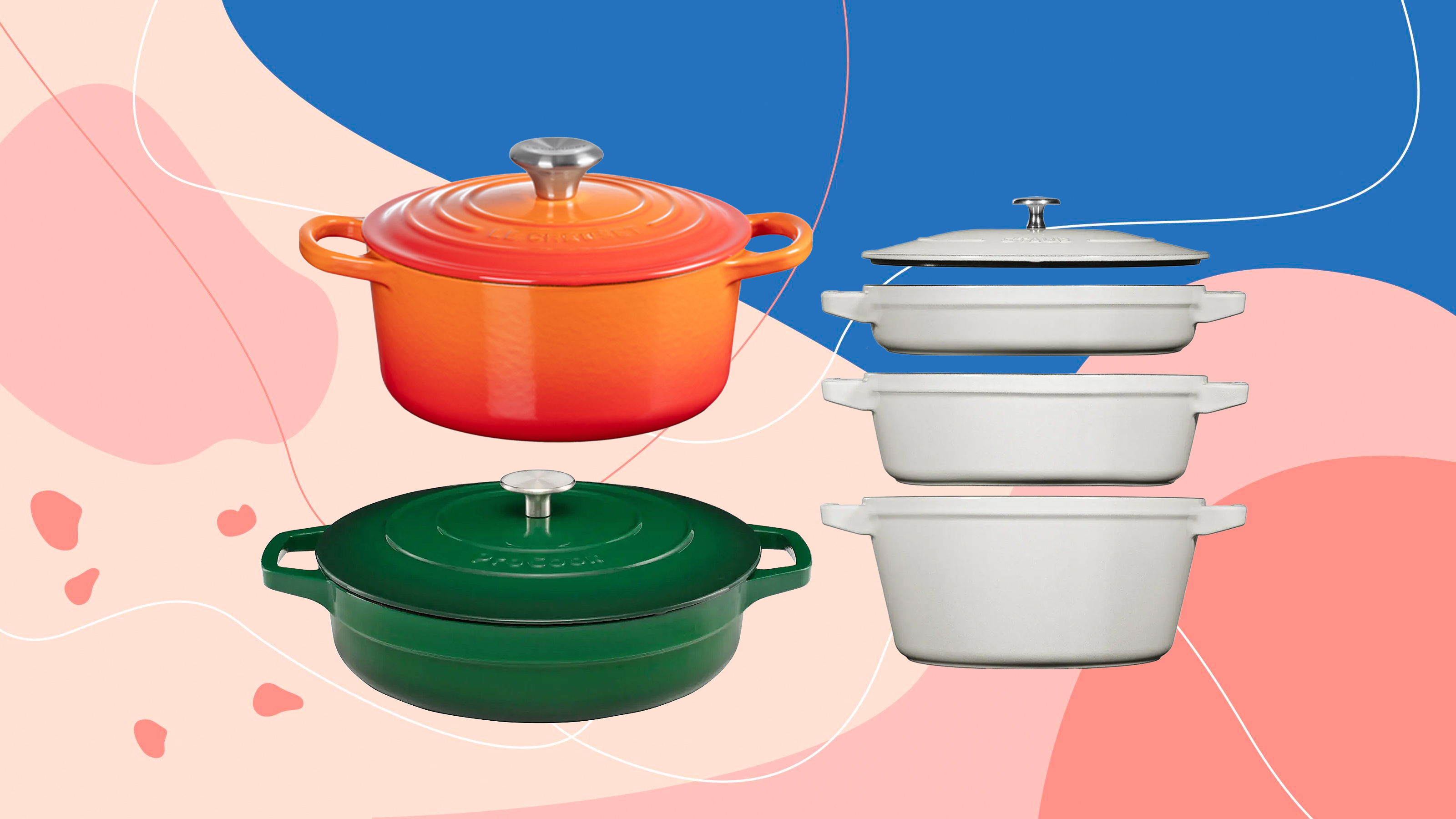

When it comes to durability, there’s no beating the best cast iron cookware. From casseroles to skillets, it’s perfectly possible to complete your entire kitchen with cast iron. While some of the more premium picks from Staub and Le Creuset can set you back a fair bit, I’ve also selected various products here that come in at under £100.
As Ideal Home's Kitchen Appliances Editor, I think that cast iron cookware is the ultimate gift for those who take cooking seriously. You could opt for something enamelled that will look eye-catching in any kitchen, or go for a cast iron skillet that will season over time. Either way, these durable and enduringly stylish picks will cook up a perfect stew or hearty chilli, or sear your steak perfectly.
I've only included products here that I've been fortunate enough to test in my own kitchen or our test kitchen for a prolonged period of time, so that you can read our complete lowdown of the best cast iron cookware you need for your kitchen.
While they are a little more high-maintenance than the best non-stick frying pans or the best saucepan sets, the best cast iron cookware will last a lifetime and often comes with a guarantee to confirm just that. Even if you're a non-stick lover, we recommend having at least one cast iron piece to get that seasoned flavour in your steak that other pans just can't achieve.
The best cast iron cookware
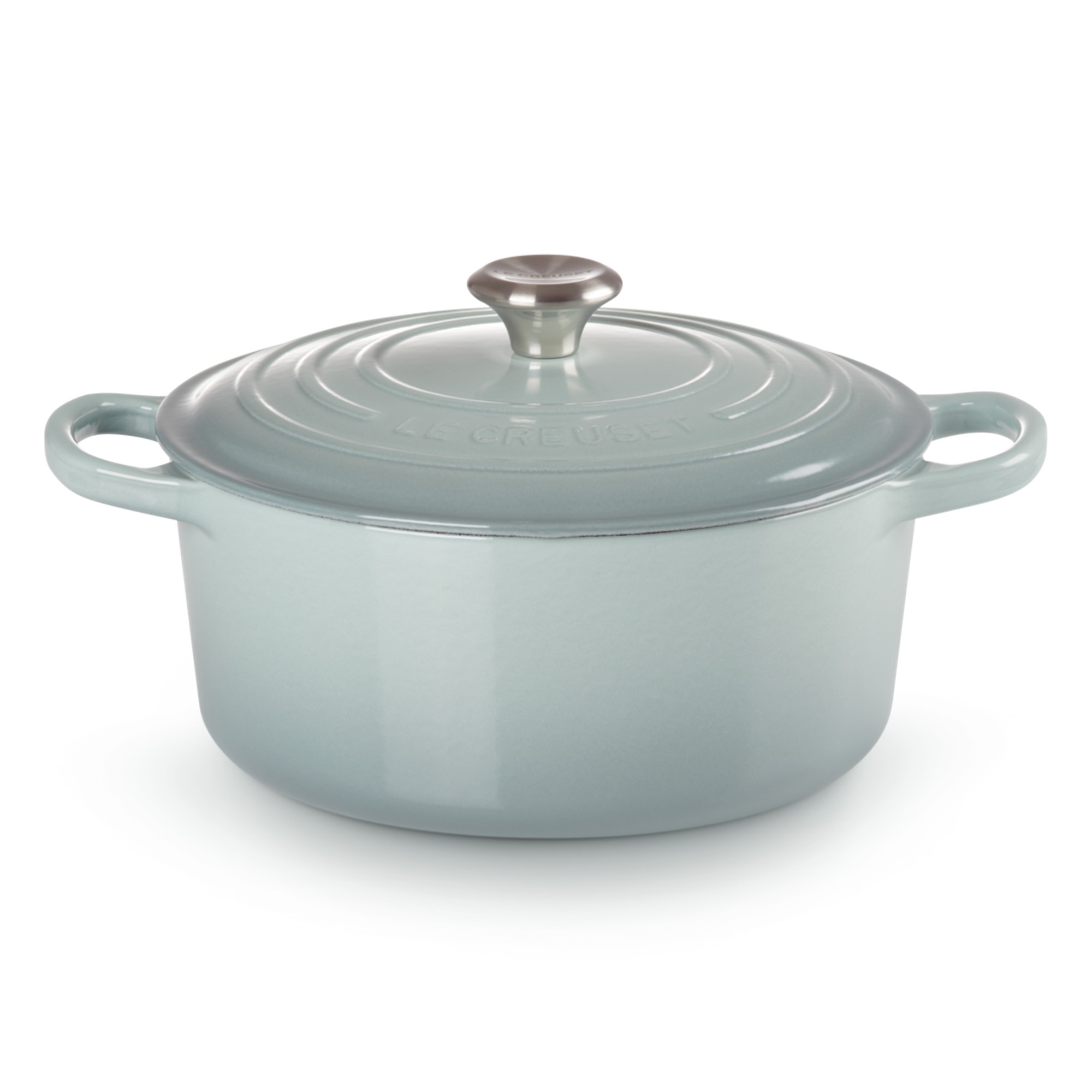
You knew this list was going to have Le Creuset on it, and I've stuck to the classics with my pick of the Cast Iron Round Casserole dish as my #1. The heat retention is unmatched, and because it's enamel-coated it can go in the dishwasher - yay! There are heaps of size and colour options to choose from, and maintenance throughout my years of ongoing use has been totally pain-free.
Even better, the Le Creuset range is covered by a lifetime guarantee meaning it can be replaced if you have any mishaps.
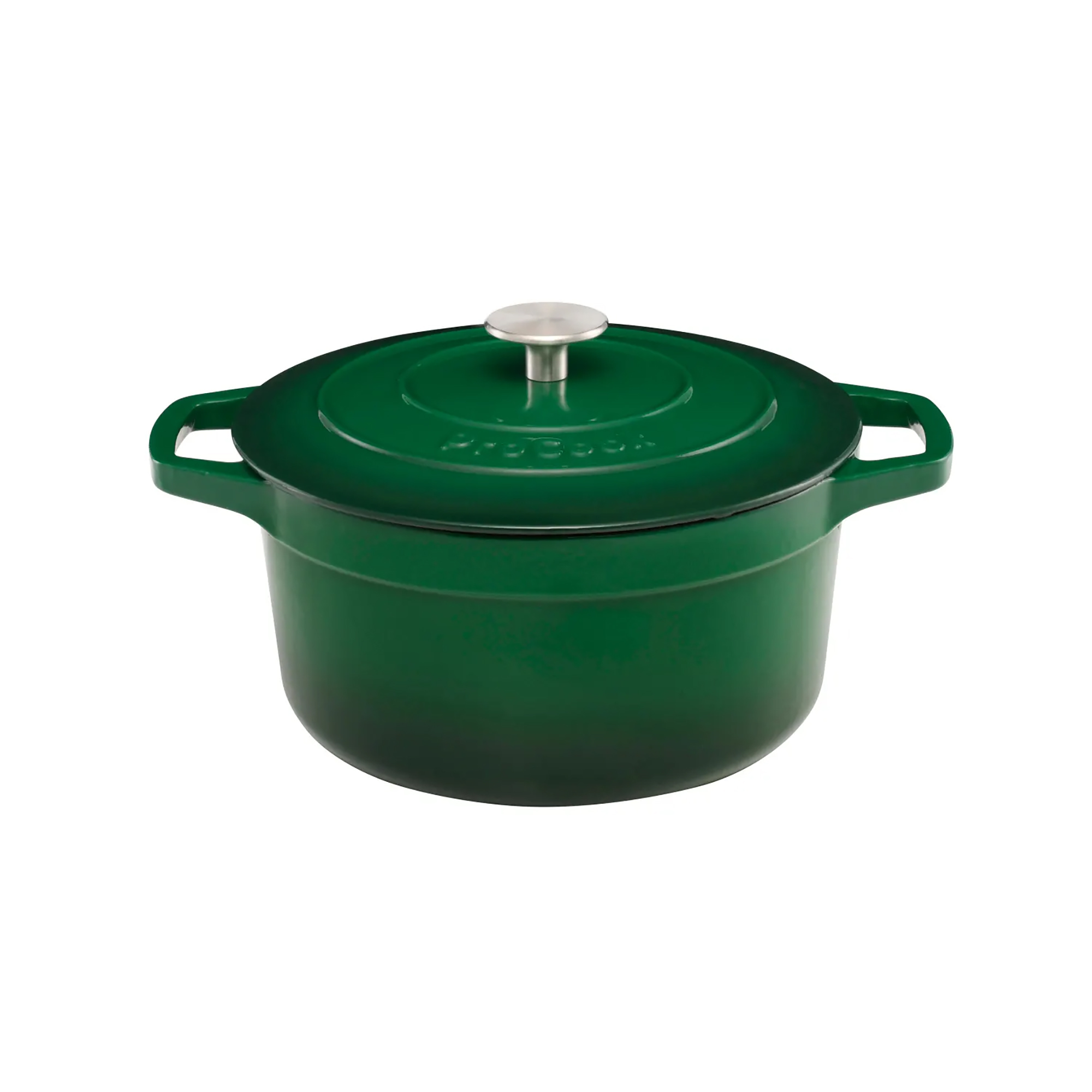
ProCook has an extensive range of reasonably-priced cast iron cookware, and multiple members of the Ideal Home team can attest that it's a brilliant value option. I've tested many ProCook pieces in my kitchen and for the price, the quality is exceptional.
This casserole is hefty, but it's crafted from molten iron for a consistent design with no weak points. The design is backed by a 25 year guarantee, which is rare for a product of this price. It also comes with a similar self-basting lid design to the Staub cocotte, and can go through the dishwasher. For the price, I couldn't fault it.
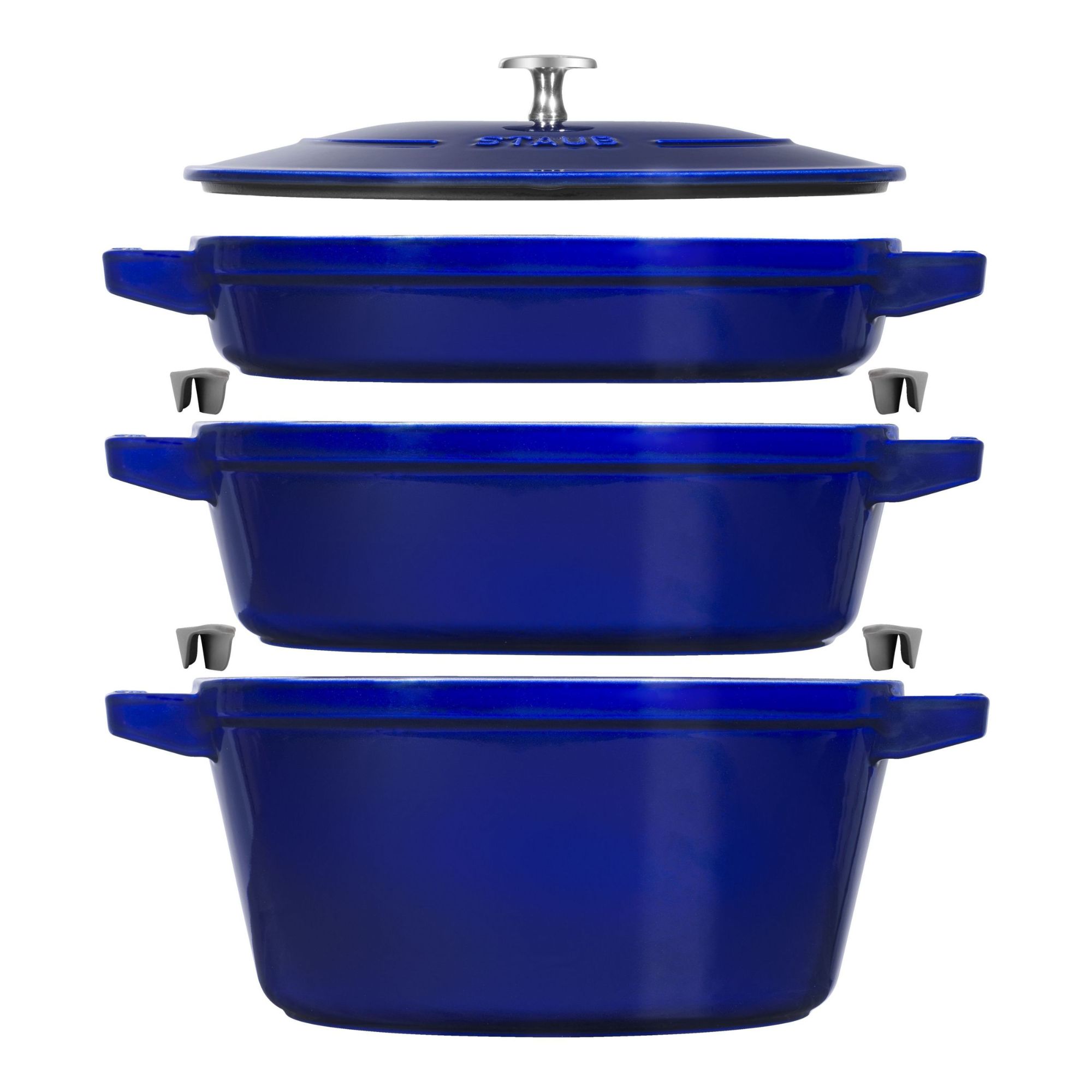
Another classic brand that’s known for its amazing cast iron, Staub really impressed us with this space-saving design. The four-piece kit includes a cocotte, braiser, grill pan, and universal lid, all of which slots neatly together for convenient storage in the tightest kitchens.
The brand includes rubberized bumpers to slot between your pans. Hang onto these, as they'll prevent damage from storage. That said, I found that the French construction looked great after months of use. The brand recommends hand-washing, but the set is dishwasher-safe.
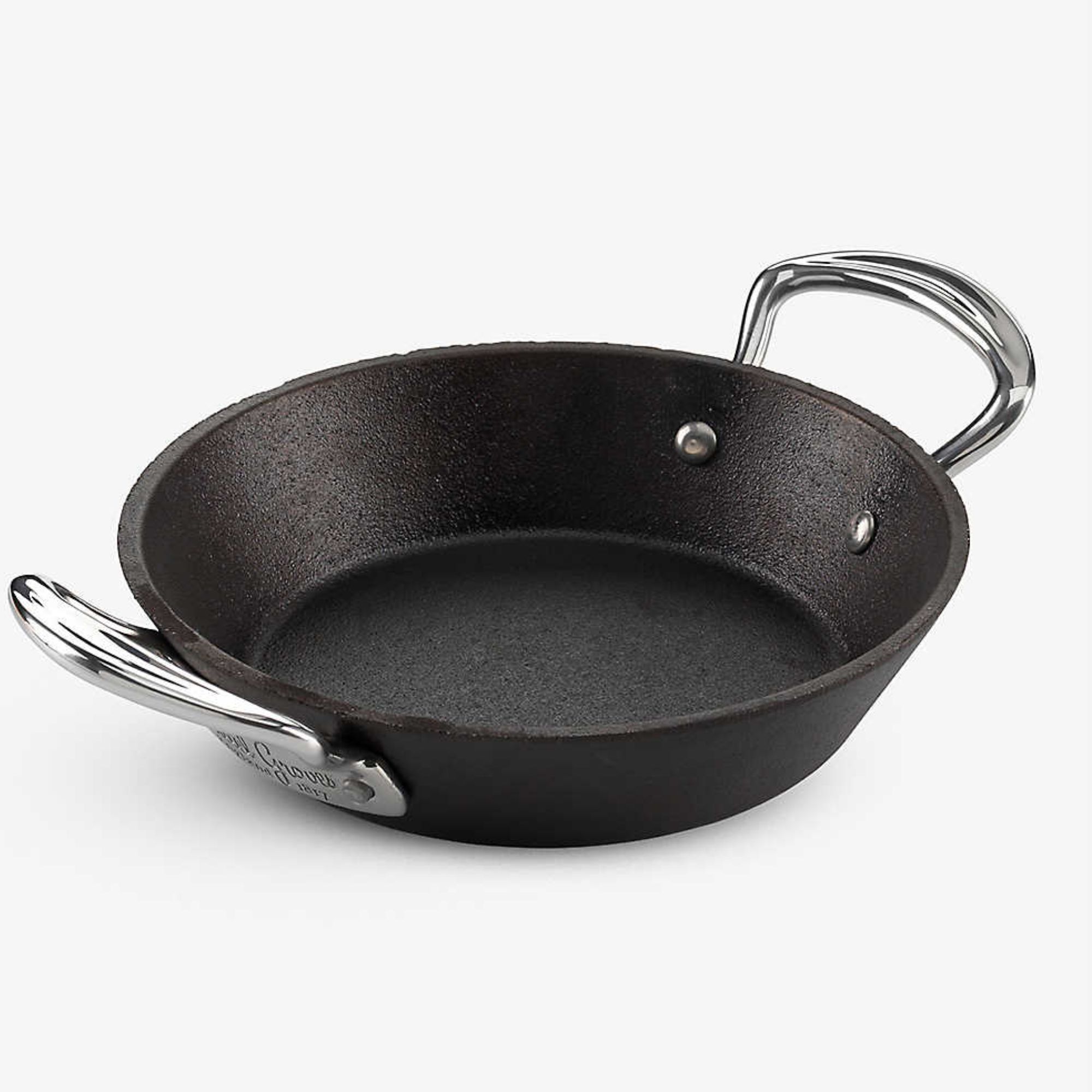
The Britannia New Cast Iron Frying Pan Skillet from Samuel Groves ticks just about all of our boxes: it’s made from 70% recycled material right here in the UK and is covered the brand’s Pan For Life scheme, meaning it can be refurbished. It’s also got a lifetime guarantee, because cast iron really is meant to last a lifetime. I loved that this skillet came pre-seasoned, and the hand-finished design does give it a more rustic feel.
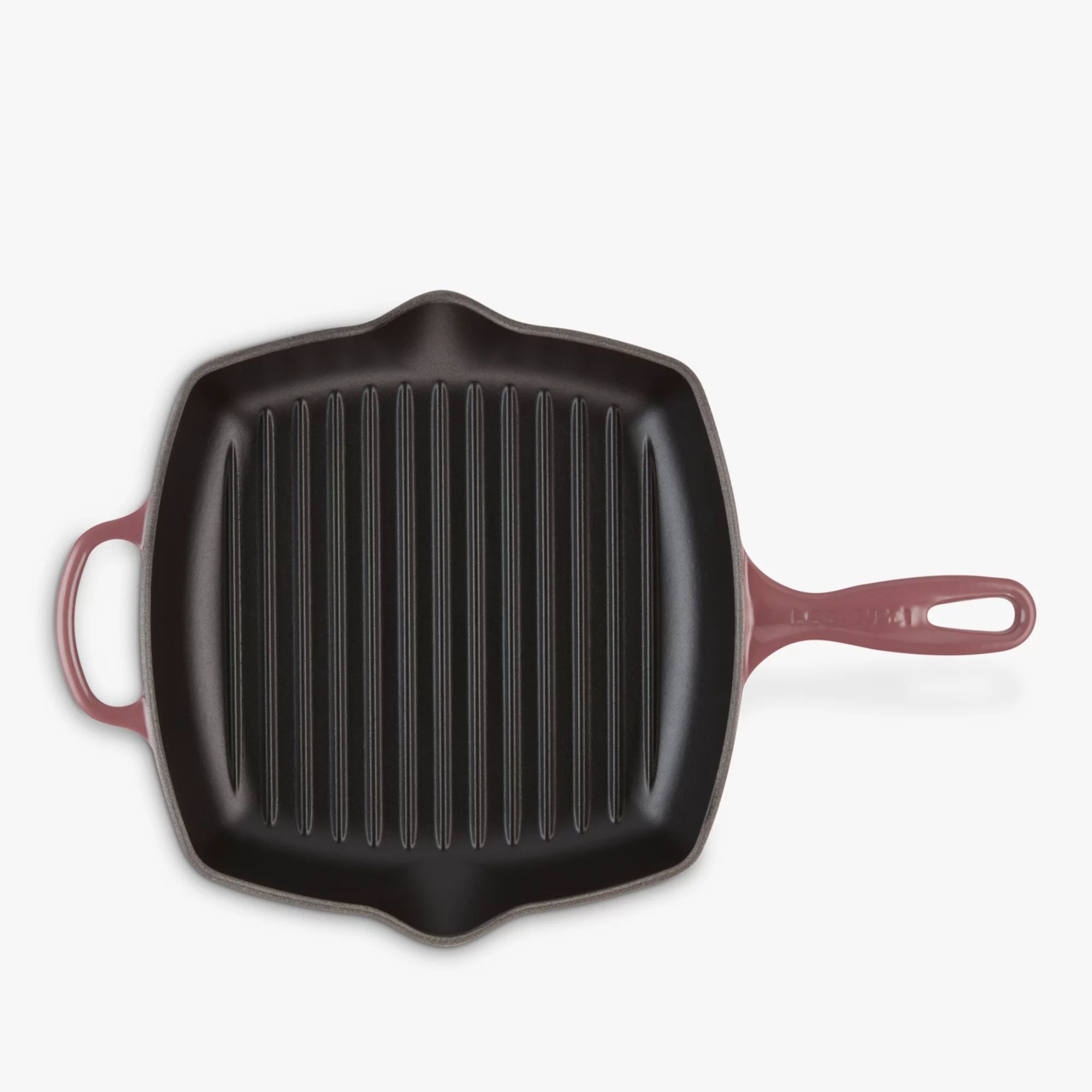
You just can’t beat those grill lines on a juicy steak or sliced aubergine. They replicate the grill marks of one of the best BBQs but with a lot less prep time. I got on very well with the Le Creuset Cast Iron Signature Square Grillit. It’s hefty at nearly 3kg, but very sturdy, and the handle helps to balance the pan when in use.
There are pouring grooves on either side of the pan which will come in handy if you’re making a tasty sauce to go with your steak or saving juices for another dish. The underside is enamelled which saves a job when cleaning, but I did find it tricky to get marks off the inside of the pan when I'd used it for some char-grilling.
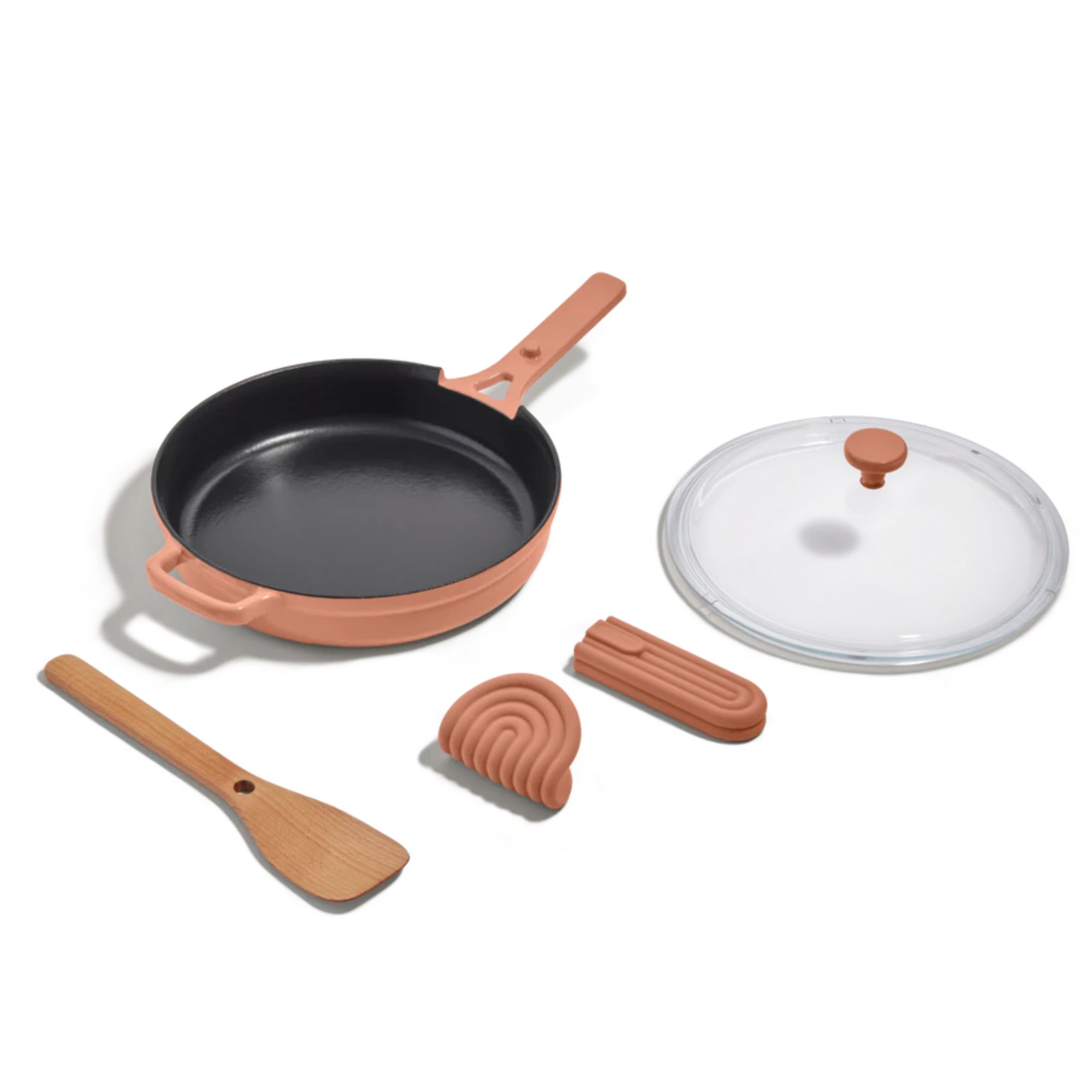
The iconic Always Pan also comes in a cast iron iteration, and we really enjoyed how well it slots together with included groovy heat guards and a glass lid. Like the original pan, there is a slot to rest your wooden spatula on the handle, but it spills slightly over the end of the handle which is a little on the short side for daily use. It gets hot quite fast, so you'll definitely make good use of those heat guards.
While it comes pre-seasoned, I did find that this was tricky to clean at first and ended up re-seasoning it. Like the original pan it can be used on all types of stoves, but it can also go in the oven, which is great for stove-to-oven cooking. At 3kg it's admittedly heavy, but a little lighter than the average cast iron pan.
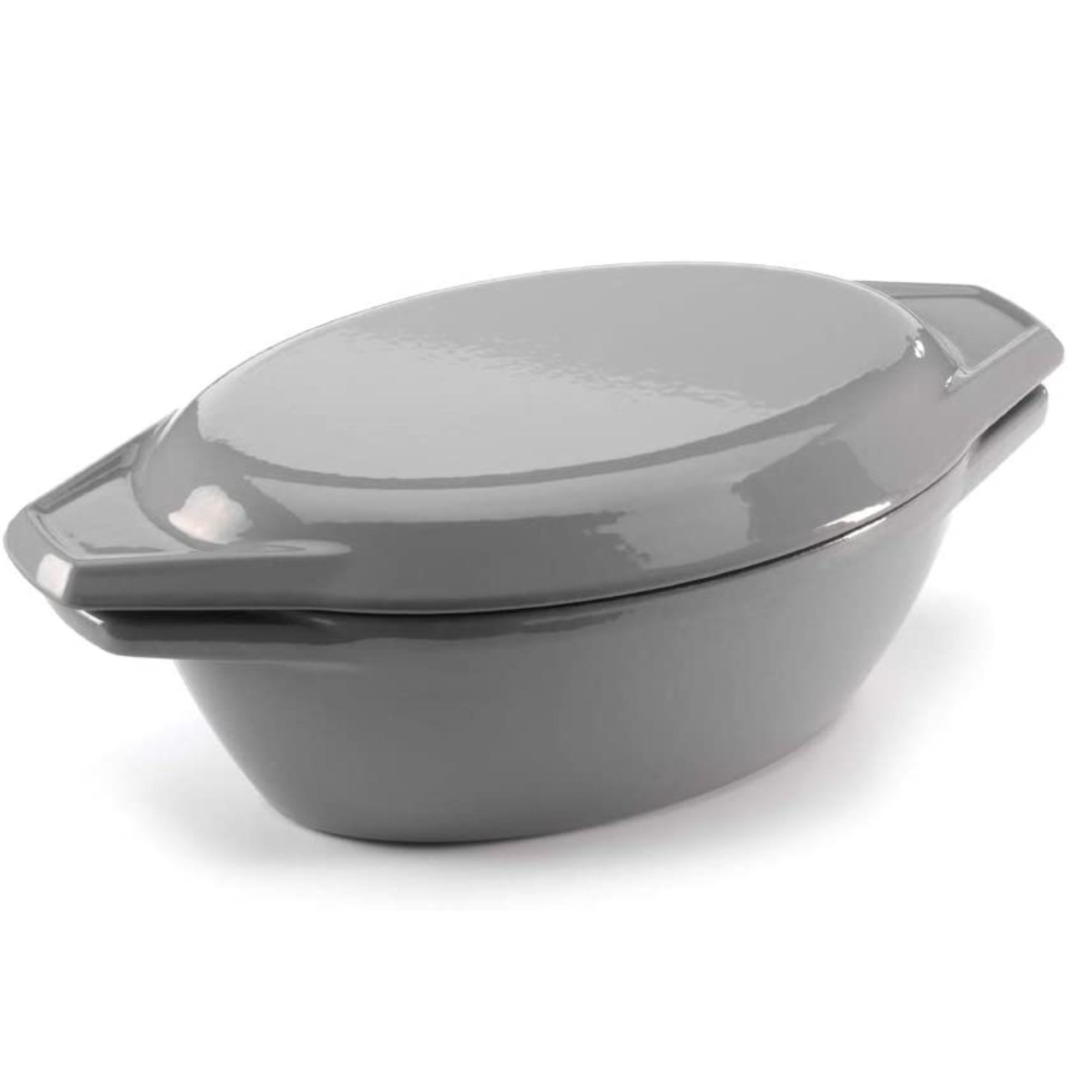
Another pick from British brand Samuel Groves, but this time not from its Britannia range. The set only comes black or in grey and white, but I thought that the grey exterior and white interior would slot perfectly into a lot of kitchen designs. I particularly love the lid on this one: it can be turned over and used as a shallower cooking surface if you wish, and it also sits securely to keep moisture in while you’re roasting.
Although it’s dishwasher-safe, the brand recommends hand-washing to keep the cast iron intact. This is true of any enamelled brand, but it’s nice to have the option of dishwasher cleaning if you’re in a rush. It’s also a great price for a product that comes with a lifetime guarantee.
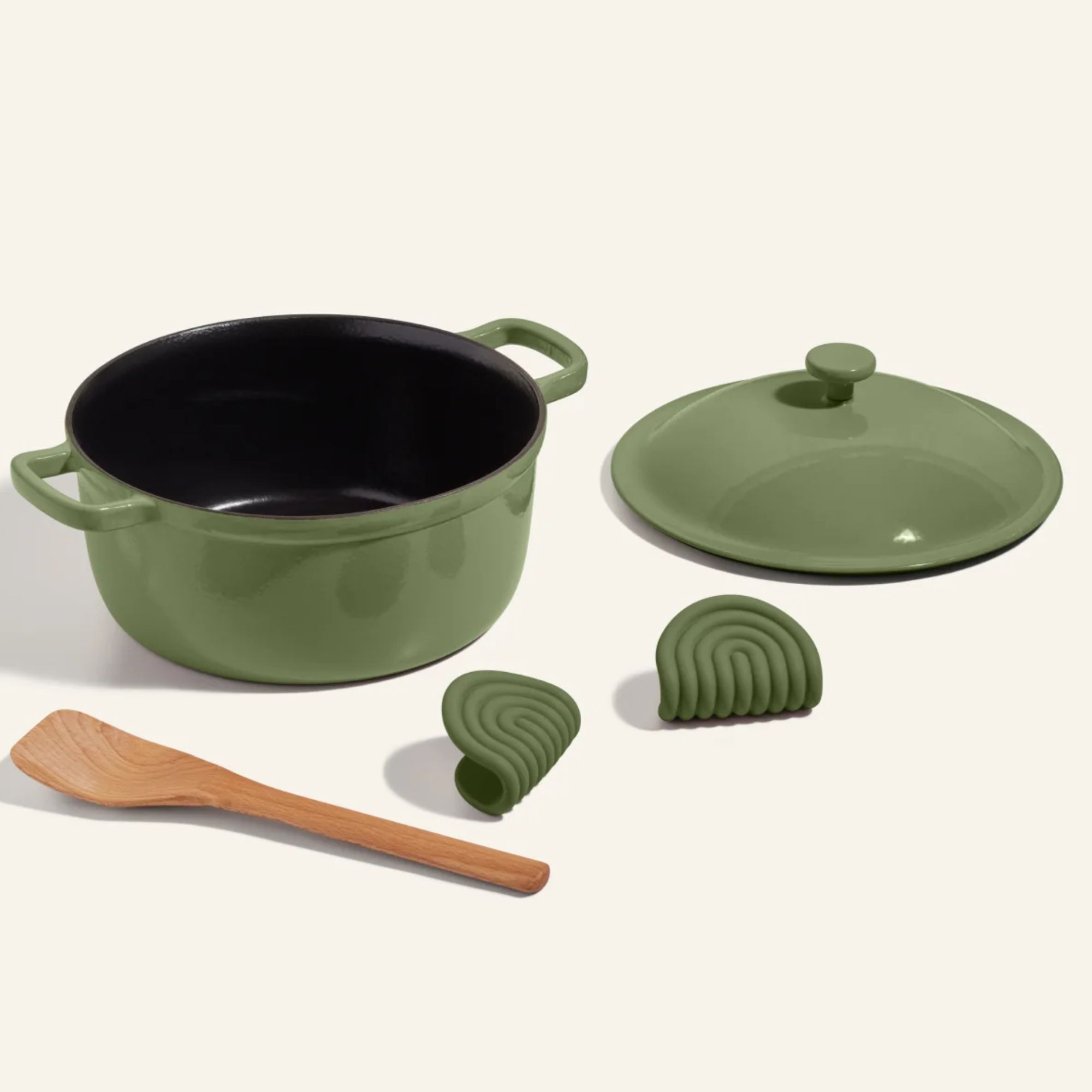
One of Our Place's latest launches, the Cast Iron Perfect Pot comes in one large size. It has over 5 litres of capacity, meaning you’ll likely get more use if you’ve got a family to feed or you enjoy bulk-cooking things such as soups and curries. If you have the Always Pan though, this addition will make a fetching duo in your kitchen, and you can mix and match lids as well as investing in an optional grill that can slot into the place of the lid on the pot for even more experimentation.
This enamelled option offers heaps of convenience when it comes to cleaning, and it's pretty good value when you compare it to some of the other options in our guide. However, it's a heavy option and will possibly be difficult to store in smaller kitchens.
How we tested the best cast iron cookware
I selected our top picks by testing them hands-on. Each and every one of these pans has been used to roast, sear, grill, or simmer. Basically, whatever they were designed to do, I interrogated through testing.
Although classic cast iron brands can set you back a few hundred pounds, I was impressed by a few of the more affordable cast iron options we tested, so there is a good variety in the prices you'll find with this list of the top picks.
FAQs
How do you look after cast iron?
If you're new to the wonderful world of cast iron, there are some things you should know before getting started. Number one on this list is how to keep your cast iron well cared for, to make sure it lasts as long as possible. We spoke to Pam Ballone from Samuel Groves to bring you all their tips before you make your investment.
"The best way to stop rusting is to season your pan and keep it in a dry place. To do this you need to apply a thin coat of a good quality vegetable oil, heat in the oven at 240 degrees centigrade for an hour or heat on a hob to a medium heat, for an hour, and leave to cool.
Once cool, wipe out any surplus oil and leave it in a cool dry place. Moisture causes cast iron cookware to rust, so it's important you store it in a dry area, away from steam and water"
Can cast iron go in the dishwasher?
"Placing cast iron in the dishwasher will strip the seasoning from the pan and is not recommended, It is best to wash by hand in hot soapy water, rinse then dry and apply a thin coat of vegetable oil."
Of course, a lot of the best cast iron cookware can also come enamelled, which means it has a layer protecting it from rusting, and won't season in the same way. In this case, be sure to check with the manufacturer, but most of the time you can put it through the dishwasher.
What are the advantages of cooking on cast iron?
"High temperatures can be obtained with cast iron, so it's ideal for searing steaks or grilling. Moreover, as the seasoning builds and absorbs into the pan there are desirable flavours build to make the tastiest burgers and steaks.
Cast Iron has amazing thermal properties and retains heat so it's also very good as cook-and-serve ware and cooking casseroles at low long temperatures."
How is cast iron cookware made?
"There is something incredibly alluring about watching the process of producing cast iron cookware. Red-hot molten iron and in the case of Samuel Groves, 70% of the molten iron comes recycled steel, including waste from the company's own cook and bakeware lines. The molten iron is poured into a mould, which then rapidly cools to become an indestructible item of cookware. Samuel Groves are so proud to produce in the UK, what is more, it helps reduce carbon footprints, secure UK jobs and skills and provide a truly sustainable product ideal for back-to-basics cooking and Michelin Star Restaurants.
The production of cast-iron cannot be rushed; time, patience and skill can only be acquired over many years to create the perfect product. Britannia is created in a modest but scalable production process, that can be easily replicated with demand. The result is premium quality battleship-build pans manufactured, and hand-finished in the Midlands."
What is the difference between cast iron and spun iron?
We chatted to Paul Marchant from Kuhn Rikon to find out about the different types of cast iron. Here's what he had to say:
"Spun Steel, otherwise known as Black Iron (which is neither black nor iron!) or Blue Steel, is made of plain steel, either pressed or spun. These are mostly used in restaurants as they are cheap and tough. They are not generally washed but are wiped clean. This helps to build a natural non-stick surface.
Cast Iron on the other hand is often coated with black enamel to make cleaning easier. Cast iron takes much longer to heat up than spun steel but has the benefit of holding heat well once it is hot. The cheaper cast iron products can suffer from uneven mould-filling resulting in cookware doesn’t heat evenly and is vulnerable to thermal shock." This will mean it can crack when there is a sudden change in temperature, so be careful about submerging hot cast iron in water or putting it in the fridge when still warm.
According to Marchant, "Spun iron is the most expensive option as it needs highly skilled craftsmen to make. The Kuhn Rikon Black Star range is Swiss-made which also substantially mitigates the environmental impact. Spinning allows for very accurate manufacture and for thinner sides to cut down on weight. Spun iron will have a highly consistent material density, which gives very even cooking."
Another difference between spun and cast iron is the weight. Generally speaking, a spun item will be lighter than cast iron, although products vary massively."
So there we have it: my essential list of cast-iron pieces for your kitchen. Do any of these take your fancy?
Get the Ideal Home Newsletter
Sign up to our newsletter for style and decor inspiration, house makeovers, project advice and more.

Molly is Ideal Home’s Kitchen Appliances Editor, the Ideal Home Certified Expert on Appliances. An all-around cooking and baking enthusiast, she loves finding the next must-have product for readers that will their kitchen a better place. She joined the team in September 2022 after working on the editorial teams of Real Homes, Homes & Gardens and Livingetc.
For the last 4 years, she's been reviewing hundreds of small appliances; conducting tests at home or in the Ideal Home test kitchen. She would be hard-pressed to pick a Mastermind specialist subject but air fryers are her ultimate area of expertise, after testing just about every single one released since 2022.
To keep ahead of trends and new releases, Molly has visited the testing and development spaces of multiple kitchen brands including Ninja Kitchen and Le Creuset as well as attended consumer shows such as IFA, hosted in Berlin to see the cooking innovations of the future.
-
 Will a conservatory add value to your home and how can you maximise it?
Will a conservatory add value to your home and how can you maximise it?This is what the pros say
By Amy Reeves
-
 I’ve been looking for a new signature scent for my home and The White Company's new fragrance is the exact summer holiday smell I needed
I’ve been looking for a new signature scent for my home and The White Company's new fragrance is the exact summer holiday smell I neededSantorini smells fresh, summery and sophisticated
By Kezia Reynolds
-
 How to remove algae from garden walls in five steps – and the cleaning product experts rave about for tackling it fast
How to remove algae from garden walls in five steps – and the cleaning product experts rave about for tackling it fastExperts share their top tips for getting garden walls algae-free
By Katie Sims